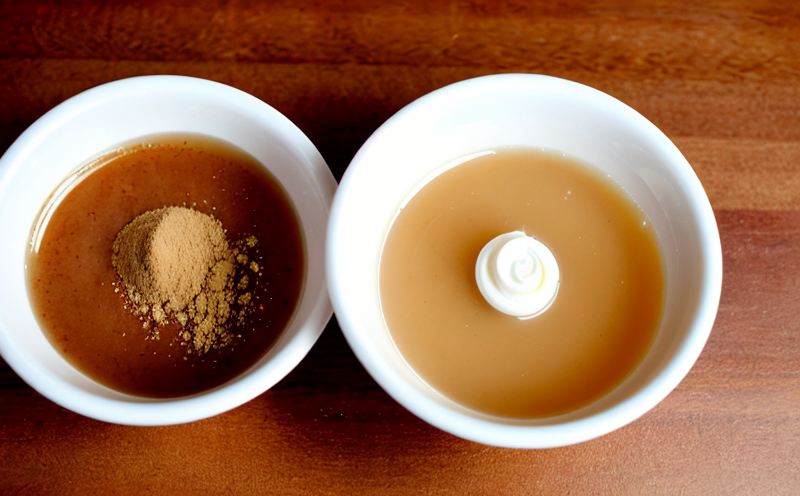CFR 172804 Aspartame Flavor Sweetener Testing
The testing of aspartame under CFR 172804 is a critical process for ensuring the safety, quality, and compliance of flavor sweeteners used in food products. This service is particularly vital for industries such as beverages, confectionery, and dietary supplements where the use of aspartame is common.
The CFR 172804 standard sets out specific requirements to ensure that aspartame meets safety criteria regarding its chemical composition, purity, and stability. Compliance with this regulation not only protects consumers but also ensures that manufacturers can legally market their products in the United States.
The testing process involves several key steps aimed at verifying compliance with the specified parameters:
- Sample Collection: Samples are collected from raw materials or finished products. Care must be taken to ensure that samples represent a true and accurate picture of the product being tested.
- Preparation: The samples undergo preparation steps which may include dissolution, dilution, or extraction processes depending on the nature of the sample.
- Analytical Testing: A range of analytical techniques are employed to assess various aspects such as purity levels, impurity identification, and stability over time. Techniques like High Performance Liquid Chromatography (HPLC), Fourier Transform Infrared Spectroscopy (FTIR), and Gas Chromatography-Mass Spectrometry (GC-MS) are commonly used.
- Validation: The results from these tests are validated against the standards set forth in
CFR 172804. This ensures that all findings align with regulatory requirements and industry best practices. - Reporting: Detailed reports are generated summarizing the test outcomes. These reports provide insights into whether the product meets the required specifications, highlighting any areas where deviations from standard were found.
The importance of this testing cannot be overstated, especially in light of increasing public awareness about health and safety issues surrounding food additives. By adhering strictly to CFR 172804, laboratories ensure that they contribute positively towards maintaining consumer trust and confidence.
Scope and Methodology
The scope of the testing encompasses several critical aspects as outlined in CFR 172804. These include:
| Aspect | Description |
|---|---|
| Purity and Composition | Determining the exact percentage of aspartame present in the sample to ensure it conforms to specified purity levels. |
| Impurities Detection | Identifying any unwanted substances that may be present which could compromise the safety or efficacy of the product. |
| Stability Over Time | Evaluating how well aspartame maintains its properties under various conditions over time to ensure long-term quality and reliability. |
| Residual Solvents Check | Ensuring that no harmful solvents remain in the final product which could pose risks to consumers. |
The methodology employed involves a series of tests designed to cover all these areas comprehensively:
| Test Type | Description |
|---|---|
| HPLC Analysis | Detailed analysis using High Performance Liquid Chromatography to determine the exact composition of aspartame in the sample. |
| FTIR Spectroscopy | Use Fourier Transform Infrared Spectroscopy for qualitative and quantitative determination of functional groups present in the sample, aiding impurity detection. |
| GC-MS Analysis | Gas Chromatography-Mass Spectrometry to identify even trace amounts of impurities or unwanted substances that might be present. |
| Residual Solvent Testing | Specific tests conducted using gas chromatography to ensure no residual solvents exceed acceptable limits. |
This comprehensive approach ensures that every aspect of aspartame compliance is thoroughly examined and validated, providing clients with peace of mind regarding the safety and quality of their products.
Quality and Reliability Assurance
- Stricter Standards Compliance: Adherence to international standards such as
CFR 172804, ISO, ASTM, EN, IEC, etc., guarantees that our testing meets the highest industry benchmarks. - State-of-the-Art Equipment: Utilization of advanced instrumentation like HPLC, FTIR, GC-MS ensures accurate and reliable results.
- Trained Technicians: Our team comprises experts trained in various analytical techniques ensuring precision during sample preparation and testing.
- Repeatable Results: Consistent outcomes across multiple tests validate the reliability of our methodologies.
- Data Integrity: Rigorous data management practices ensure that all test results are accurately recorded, stored, and retrievable when needed.
The combination of these factors ensures that we deliver consistent, accurate, and reliable testing services, which is crucial for maintaining compliance with regulatory bodies like the FDA in the U.S.
Competitive Advantage and Market Impact
- Enhanced Consumer Trust: By ensuring strict adherence to
CFR 172804, we help manufacturers build stronger brand reputations, fostering customer loyalty. - Informed Decision-Making: Providing comprehensive and accurate test results allows companies to make informed decisions regarding product development and quality control measures.
- Avoidance of Regulatory Penalties: Compliance with these regulations helps avoid costly fines and legal actions that non-compliance can lead to.
- Market Expansion Opportunities
Our expertise in this area opens doors for companies looking to expand into new markets or introduce innovative products. By demonstrating commitment to quality through consistent compliance, businesses can position themselves favorably against competitors who may not adhere as closely to such standards.
Frequently Asked Questions
CFR 172804, which pertains to the United States, our laboratory follows international standards and practices that can be adapted for other regions as needed.




